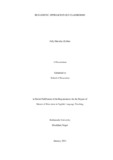
Please use this identifier to cite or link to this item:
https://hdl.handle.net/20.500.14301/232| Title: | HUMANISTIC APPROACH IN ELT CLASSROOMS |
| Authors: | Shrestha (Subba), Jolly |
| Citation: | Shrestha (Subba),J.(2014).Humanistic approach in ELT classrooms. |
| Issue Date: | 2014 |
| School: | SOED |
| Department: | DOLE |
| Level: | Masters |
| Program: | Master of Education in ELT (2 years) |
| Abstract: | Teaching and learning is more than transmitting skills. It involves obligation, trust, care, commitment and justification. Now the demand of the 21st century education is more human. It is time for every teacher or educator to reflect on the challenges and dilemmas in education system and in their own teaching practice. In recent years, the focus of the education system is towards effective teaching and learning. Teaching and learning principles do not only carry theories of teaching skills but go beyond it. Teachers must not only feel psychologically and emotionally comfortable but they need to have some sense of beliefs and care to make a difference in the lives of learners in teaching and learning in context to Nepal. A classroom is a place where a climate of trust can be built between the learners and the teachers. This trust can act as a scaffold for learning only through caring and sharing atmosphere. Learner’s life has to have some meaning and they need to experience joy and they need to be treated as a human being by the teacher. The main purpose of this study was to explore the humanistic strategies in ELT classrooms and teacher’s perception towards the essence of humanism in the ELT classrooms. This study also shed light onto the challenges faced by the English Language Teaching Teachers in implementing the humanistic approach in ELT Classrooms. This study was carried out with six selected participants from the schools of Lalitpur and Kathmandu Valley. I collected data through open-ended interviews and class observations. I adopted qualitative and interpretive research paradigm to obtain a clear insight of the humanistic scenario in real classroom teaching and learning context and perceptions of ELT teachers. The findings of this study showed that all the participants had better understanding on caring and sharing environment in the ELT classroom. The humanistic approach in the ELT classes functions effectively in the ELT classrooms. All the participants were concerned about the psychological and emotional aspects of the learners. The findings revealed that the affective factors were the most essential part in humanizing the classroom teaching. Thus, Humanistic Approach helps the teacher to build in trust and a good rapport with their learners. On the basis of the research findings, I have drawn some pedagogical implications of this study and I have highlighted other aspects of humanistic approach for future researchers and concluded with my exploration to this dissertation journey. The information obtained from this research is expected to be useful to the teachers, colleagues, curriculum designers, educators and an attempt to improve my professionalism. |
| URI: | https://hdl.handle.net/20.500.14301/232 |
| Appears in Collections: | Research Report |
Files in This Item:
| File | Description | Size | Format | |
|---|---|---|---|---|
| Jolly_2014_Final_Thesis_for_KU[1].pdf | 1.11 MB | Adobe PDF |  View/Open |
Items in DSpace are protected by copyright, with all rights reserved, unless otherwise indicated.